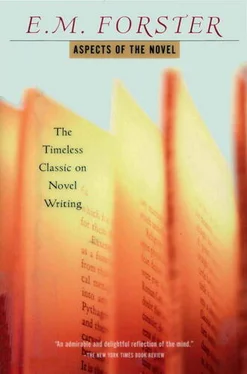It does not add much. It does not give us anything as important as the author's personality. His personality—when he has one—is conveyed through nobler agencies, such as the characters or the plot or his comments on life. What the story does do in this particular capacity, all it can do, is to transform us from readers into listeners, to whom "a" voice speaks, the voice of the tribal narrator, squatting in the middle of the cave, and saying one thing after another until the audience falls asleep among their offal and bones. The story is primitive, it reaches back to the origins of literature, before reading was discovered, and it appeals to what is primitive in us. That is why we are so unreasonable over the stories we like, and so ready to bully those who like something else. For instance, I am annoyed when people laugh at me for loving The Swiss Family Robinson, and I hope that I have annoyed some of you over Scott! You see what I mean. Intolerance is the atmosphere stories generate. The story is neither moral nor is it favourable to the understanding of the novel in its other aspects. If we want to do that we must come out of the cave.
We shall not come out of it yet, but observe already how that other life—the life by value—presses against the novel from all sides, how it is ready to fill and indeed distort it, offering it people, plots, fantasies, views of the universe, anything except this constant "and then . . . and then," which is the sole contribution of our present inquiry. The life in time is so obviously base and inferior that the question naturally occurs: cannot the novelist abolish it from his work, even as the mystic asserts he has abolished it from his experience, and install its radiant alternative alone?
Well, there is one novelist who has tried to abolish time, and her failure is instructive: Gertrude Stein. Going much further than Emily Brontë, Sterne or Proust, Gertrude Stein has smashed up and pulverized her clock and scattered its fragments over the world like the limbs of Osiris, and she has done this not from naughtiness but from a noble motive: she has hoped to emancipate fiction from the tyranny of time and to express in it the life by values only. She fails, because as soon as fiction is completely delivered from time it cannot express anything at all, and in her later writing we can see the slope down which she is slipping. She wants to abolish this whole aspect of the story, this sequence in chronology, and my heart goes out to her. She cannot do it without abolishing the sequence between the sentences. But this is not effective unless the order of the words in the sentences is also abolished, which in its turn entails the abolition of the order of the letters or sounds in the words. And now she is over the precipice. There is nothing to ridicule in such an experiment as hers. It is much more important to play about like this than to rewrite the Waverley Novels. Yet the experiment is doomed to failure. The time-sequence cannot be destroyed without carrying in its ruin all that should have taken its place; the novel that would express values only becomes unintelligible and therefore valueless.
That is why I must ask you to join me in repeating in exactly the right tone of voice the words with which this lecture opened. Do not say them vaguely and good-temperedly like a busman: you have not the right. Do not say them briskly and aggressively like a golfer: you know better. Say them a little sadly, and you will be correct. Yes—oh, dear, yes— the novel tells a story.
HAVINGdiscussed the story—that simple and fundamental aspect of the novel—we can turn to a more interesting topic: the actors. We need not ask what happened next, but to whom did it happen; the novelist will be appealing to our intelligence and imagination, not merely to our curiosity. A new emphasis enters his voice: emphasis upon value.
Since the actors in a story are usually human, it seemed convenient to entitle this aspect People. Other animals have been introduced, but with limited success, for we know too little so far about their psychology. There may be, probably will be, an alteration here in the future, comparable to the alteration in the novelist's rendering of savages in the past. The gulf that separates Man Friday from Batouala may be paralleled by the gulf that will separate Kipling's wolves from their literary descendants two hundred years hence, and we shall have animals who are neither symbolic, nor little men disguised, nor as four-legged tables moving, nor as painted scraps of paper that fly. It is one of the ways where science may enlarge the novel, by giving it fresh subject-matter. But the help has not been given yet, and until it comes we may say that the actors in a story are, or pretend to be, human beings.
Since the novelist is himself a human being, there is an affinity between him and his subject-matter which is absent in many other forms of art. The historian is also linked, though, as we shall see, less intimately. The painter and sculptor need not be linked: that is to say they need not represent human beings unless they wish, no more need the poet, while the musician cannot represent them even if he wishes, without the help of a programme. The novelist, unlike many of his colleagues, makes up a number of word-masses roughly describing himself (roughly: niceties shall come later), gives them names and sex, assigns them plausible gestures, and causes them to speak by the use of inverted commas, and perhap to behave consistently. These word-masses are his characters. They do not come thus coldly to his mind, they may be created in delirious excitement; still, their nature is conditioned by what he guesses about other people, and about himself, and is further modified by the other aspects of his work. This last point—the relation of characters to the other aspects of the novel—will form the subject of a future inquiry. At present we are occupied with their relation to actual life. What is the difference between people in a novel and people like the novelist or like you, or like me, or Queen Victoria?
There is bound to be a difference. If a character in a novel is exactly like Queen Victoria—not rather like but exactly like—then it actually is Queen Victoria, and the novel, or all of it that the character touches, becomes a memoir. A memoir is history, it is based on evidence. A novel is based on evidence + or – x, the unknown quantity being the temperament of the novelist, and the unknown quantity always modifies the effect of the evidence, and sometimes transforms it entirely.
The historian deals with actions, and with the characters of men only so far as he can deduce them from their actions. He is quite as much concerned with character as the novelist, but he can only know of its existence when it shows on the surface. If Queen Victoria had not said, "We are not amused," her neighbours at table would not have known she was not amused, and her ennui could never have been announced to the public. She might have frowned, so that they would have deduced her state from that—looks and gestures are also historical evidence. But if she remained impassive—what would anyone know? The hidden life is, by definition, hidden. The hidden life that appears in external signs is hidden no longer, has entered the realm of action. And it is the function of the novelist to reveal the hidden life at its source: to tell us more about Queen Victoria than could be known, and thus to produce a character who is not the Queen Victoria of history.
The interesting and sensitive French critic who writes under the name of Alain has some helpful if slightly fantastic remarks on this point. He gets a little out of his depth, but not as much as I feel myself out of mine, and perhaps together we may move toward the shore. Alain examines in turn the various forms of aesthetic activity, and coming in time to the novel (le roman) he asserts that each human being has two sides, appropriate to history and fiction. All that is observable in a man—that is to say his actions and such of his spiritual existence as can be deduced from his actions—falls into the domain of history. But his romanceful or romantic side (sa partie romanesque ou romantique) includes "the pure passions, that is to say the dreams, joys, sorrows and self-communings which politeness or shame prevent him from mentioning"; and to express this side of human nature is one of the chief functions of the novel. "What is fictitious in a novel is not so much the story as the method by which thought develops into action, a method which never occurs in daily life. . . . History, with its emphasis on external causes, is dominated by the notion of fatality, whereas there is no fatality in the novel; there, everything is founded on human nature, and the dominating feeling is of an existence where everything is intentional, even passions and crimes, even misery." [3] Paraphrased from Système des Beaux Arts, pp. 314-315. I am indebted to M. André Maurois for introducing me to this stimulating essay.
Читать дальше












